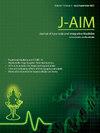Add on effect of Whole System Ayurveda protocol in suboptimal controlled Primary Hypothyroidism - A randomized controlled trial
IF 1.7
Q3 INTEGRATIVE & COMPLEMENTARY MEDICINE
引用次数: 0
Abstract
Background
Primary hypothyroidism (PH) is a common chronic life style disorder. Whole system Ayurveda protocol on PH (WSAPH) is explored for it's possible complimentary role in the management of suboptimal controlled PH on stable levothyroxine therapy.
Objective
To evaluate the efficacy of whole system Ayurveda protocol on Primary hypothyroidism with suboptimal response to stable levothyroxine therapy.
Material and methods
Study was a randomized controlled trial. Total 46 known patients of suboptimal response to stable levothyroxine therapy, age group 20–60 years of either sex participated in the study. They were randomly placed in two groups, Group KG received Kanchanara guggulu two tablets of 500 mg each, thrice a day with water and group WSAPH was on whole system Ayurveda protocol for primary hypothyroidism (WSAPH). Interventions were for 60 days. Assessments were done through various parameters like Thyroid profiles (TSH, T3, T4, Free T4), Weight, BMI, Skin fold thickness (SFT), Body fat index (BFI), Waist hip ratio (WHR), Lipid profile, Zulewskis clinical score for hypothyroidism (ZUL), WHO Quality of Life- BREF (WHOQOL-BREF), Clinical Global Improvement scales (CGI). Clinical assessments were done on every 15th day and biochemical were done before and after interventions.
Results
Study showed that WSAPH group produced significant outcome improvement compared to KG group in TSH (p = 0.02), weight (p = 0.02), SFT (p = 0.04), BFI (p = 0.01), WHOQOL-BREF (p = 0.004) and ZUL (p = 0.02). Both the group showed improvements in BMI, WHR, BFI, SFT, WHOQOL-BREF, ZUL, CGI scales. Effect size was medium in TSH, weight, BFI, SFT and ZUL.
Conclusion
WSAPH was effective in management of PH and normalized TSH and ZUL scores in patients with suboptimal response to stable levothyroxine therapy. Further studies are needed.

全系统阿育吠陀方案对亚理想控制原发性甲状腺功能减退的影响-一项随机对照试验。
背景:原发性甲状腺功能减退症(PH)是一种常见的慢性生活方式障碍。探讨阿育吠陀PH全系统方案(wwsh)在稳定左甲状腺素治疗控制PH次优的管理中可能发挥的补充作用。目的:评价阿育吠陀全系统治疗原发性甲状腺功能减退症对稳定左甲状腺素治疗反应不佳的疗效。材料与方法:研究为随机对照试验。共有46例已知对稳定左甲状腺素治疗反应不佳的患者,年龄20-60岁,男女不限。随机分为两组,KG组患者给予Kanchanara gugugululu 2片,每片500 mg,每日3次,加水治疗;wwsh组患者采用全系统阿育吠陀治疗原发性甲状腺功能减退(wwsh)。干预期为60天。通过各种参数进行评估,如甲状腺谱(TSH、T3、T4、游离T4)、体重、BMI、皮肤厚度(SFT)、体脂指数(BFI)、腰臀比(WHR)、脂质谱、Zulewskis甲状腺功能减退临床评分(ZUL)、WHO生活质量-BREF (WHOQOL-BREF)、临床总体改善量表(CGI)。每15天进行一次临床评估,干预前后进行生化检查。结果:与KG组比较,wwsh组在TSH (p = 0.02)、体重(p = 0.02)、SFT (p = 0.04)、BFI (p = 0.01)、WHOQOL-BREF (p = 0.004)、ZUL (p = 0.02)方面均有显著改善。两组BMI、WHR、BFI、SFT、WHOQOL-BREF、ZUL、CGI量表均有改善。TSH、体重、BFI、SFT和ZUL的效应量为中等。结论:在对稳定左甲状腺素治疗反应不佳的患者中,wwsh可有效管理PH、TSH和ZUL标准化评分。需要进一步的研究。
本文章由计算机程序翻译,如有差异,请以英文原文为准。
求助全文
约1分钟内获得全文
求助全文
来源期刊

Journal of Ayurveda and Integrative Medicine
INTEGRATIVE & COMPLEMENTARY MEDICINE-
CiteScore
4.70
自引率
12.50%
发文量
136
审稿时长
30 weeks
 求助内容:
求助内容: 应助结果提醒方式:
应助结果提醒方式:


